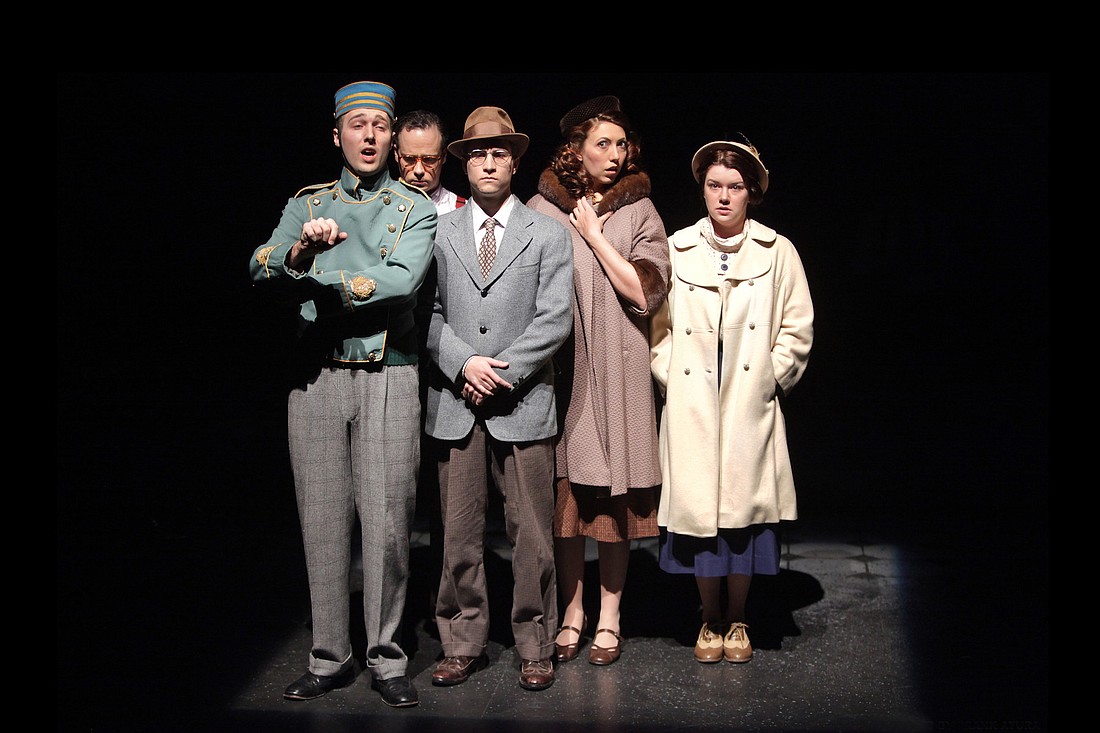- November 25, 2024
-
-
Loading

Loading

David Mamet’s “The Water Engine” began life as a radio drama in 1977. The FSU/Asolo Conservatory has fired it up again. Director Greg Leaming stages it in a weird, indeterminate nether space. Part of the stage is decked out as a radio studio; actors at mics read their parts and a Foley artist creates sounds. On the rest of the stage, other actors perform in synch to the implied radio show, their semi-staged vignettes revealed in cones of spotlight. The mash-up of media and representations nicely fits the play’s subject: one of the classic, all-American conspiracy theories.
Namely, an engine that runs on water suppressed by a corporate cabal.
Here, Mamet gives a name to the suppressed inventor — Charles Lang (Josh James). A brilliant but poor punch press operator, Lang builds the engine in his spare time in Chicago in 1934. Ironically, the Windy City is simultaneously hosting the World’s Fair — the Century of Progress International Exposition. That fair is a quasi-religious celebration of American inventors and their inventions. The real America proves less worshipful. When Lang approaches a patent lawyer (Chris Alexey Diaz), all his paranoid fears come true. The lawyer rats him out to a stooge of unnamed corporate interests (Jordan Sobel). Powerful forces attempt to suppress Lang’s invention — and kidnap his blind sister (Lisa Woods) as leverage. In a Frank Capra movie, the fat cats would fail and the underdog (played by Jimmy Stewart, natch) would triumph. But this isn’t a Capra movie. The underdog ends badly.
Mamet intercuts this straightforward fable with a surreal montage, zipping back and forth between fragments of Lang’s downfall, snippets of a crazed chain letter, gee-whiz plugs for the exposition and bits of business in the radio station. Unrealistic material? You’d better believe it.
Call it a bad dream. But a bad dream beautifully realized. Leaming’s sense of stagecraft is impeccable. The scene where Lang runs in terror from police (or hired thugs dressed as police) is believable and raw.
As to the actors, the cast of second-year conservatory students perform with the skill of longtime veterans. James nicely portrays a paranoid patsy who isn’t paranoid enough. Woods is heartbreaking as his doomed sister. Mark Comer and Tom Harney are fine as a friendly father-and-son duo straight out of a Mickey Rooney movie. Diaz and Sobel are equally fine as a bad cop/worse cop duo. Kudos also to Kevin Barber (a reporter who doesn’t break the story of the century), Kelsey Petersen (a friendly neighbor who’s caught in the conspiracy) and all the other actors working in the shadows. Speaking of which …
This play explores the shadowlands. Expect no define statements. Expect a staccato fable with no definite conclusions. This is early Mamet, with a heavy debt to Brecht, Beckett and Pinter. You think his language is telegraphic now? The dialogue here makes “Oleanna” and “Glengarry Glen Ross” seem loquacious.
So what’s the moral of this fable?
That’s in the shadows, too.
Mamet’s play isn’t a literal expose of the water engine conspiracy, any more than Kafka’s “The Trial” was about a bad court decision in the Weimar Republic. Call it a comparison and contrast between the American Dream and the American Nightmare. But don’t call it a mere fable …
As surreal as the play is, it speaks of reality. And, no, not the reality of a water engine. The reality of those who would suppress it.
Such science literacy as I possess tells me a water engine wouldn’t work; the catalytic energy needed to split hydrogen from oxygen would exceed the energy released in burning the resulting hydrogen. But conspiracies against inventors do work.
The suppressions of Nikola Tesla’s later inventions can’t be proved. But RCA tycoon David Sarnoff’s suppression of Philo Farnsworth’s television technology and Edwin Armstrong’s frequency modulation are historic facts. In 1954, a beaten, broken Armstrong took a walk outside his 13th floor apartment window in his best suit.
The result wasn’t conspiracy theory but a coroner’s report. Look it up.
IF YOU GO
“The Water Engine” runs through Nov. 23, at the FSU Center for the Performing Arts, 5555 N. Tamiami Trail, Sarasota. Call 351-8000 or visit asolorep.org/conservatory for more information.